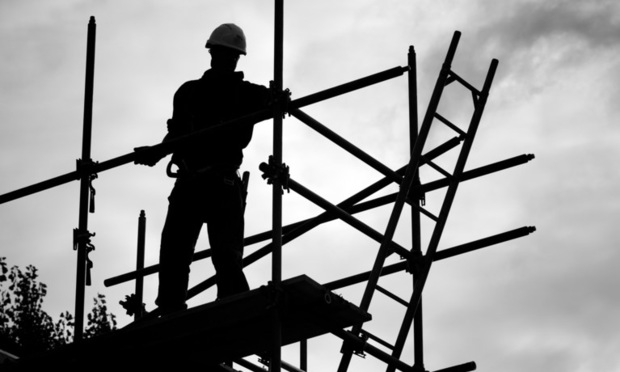Carpenter Injured in Scaffolding Fall Awarded $2.5M by Phila. Jury
A carpenter who alleged that scaffolding he fell from was defective has been awarded a $2.5 million verdict by a Philadelphia jury.
May 14, 2019 at 03:39 PM
3 minute read
 Photo: Bigstock
Photo: Bigstock
A carpenter who alleged that scaffolding he fell from was defective has been awarded a $2.5 million verdict by a Philadelphia jury.
The verdict came down May 10 after a two-week trial in Sullivan v. Werner Co. in Philadelphia Court of Common Pleas Judge Michael E. Erdos' courtroom.
Plaintiff Michael Sullivan claimed that defendant Werner Co.'s “Baker” scaffolds were defectively designed and came with insufficient warnings. Sullivan alleged that, while working at Albert Schweitzer Elementary School in Levittown in June 2014, the deck pin—which keeps a scaffold from collapsing—dislodged, causing the platform to fall out from under him, according to court papers.
He fractured his tailbone and sustained other orthopedic injuries. He claimed to have ongoing difficulties with back pain, which cut short his career. He also claimed to require continuing medical care and extensive physical therapy relating to multiple hernias.
Jeffrey F. Laffey and Stewart Ryan of Laffey, Bucci & Kent in Philadelphia represented Sullivan.
'We were able to prove that the deck pin safety features of Werner's scaffolds were actually the hazards that ended Mr. Sullivan's career,” Laffey said in a statement. “This case underscores the importance of a manufacturer's duty to design a product that eliminates foreseeable hazards—not to create them.”
Michael Dunn of the Law Offices of Michael J. Dunn represented Werner and Lowes, which sold the scaffolding.
“The verdict was against the great weight of the evidence and contrary to Pennsylvania law,” Dunn said. “Post-trial motions and an appeal will be pursued.”
The plaintiff claimed in court papers, “Defendant, Werner, touts itself as 'No. 1 in Ladders.' However, it cannot call themselves No. 1 in scaffolds due to the flimsy and unsafe design of its steel rolling scaffolds such as the one involved in Mr. Sullivan's accident.”
“Fred Bartnicki, Werner's senior engineer and corporate designee, testified that Werner began manufacturing steel rolling scaffolds in 2010. The design phase, which preceded the mass-production involved a 'gatekeeper process,' which was described as input from Werner's engineering department, legal department and marketing department,” the papers continued. “Werner's Model SRS72 scaffold was the culmination in certain respects of this 'gatekeeper process' where other manufacturers' designs were evaluated and incorporated. … Werner should have relied upon other manufactures' designs that were far superior in ensuring that the scaffold's platform remained secured during its foreseeable use.”
Werner denied that its product was defective.
“The product is designed such that, if properly used, according to clear and explicit instructions and warnings on the product, the accident could not have occurred as plaintiff maintains it did,” the defendants' court papers said.
This content has been archived. It is available through our partners, LexisNexis® and Bloomberg Law.
To view this content, please continue to their sites.
Not a Lexis Subscriber?
Subscribe Now
Not a Bloomberg Law Subscriber?
Subscribe Now
NOT FOR REPRINT
© 2025 ALM Global, LLC, All Rights Reserved. Request academic re-use from www.copyright.com. All other uses, submit a request to [email protected]. For more information visit Asset & Logo Licensing.
You Might Like
View All


Stevens & Lee Hires Ex-Middle District of Pennsylvania U.S. Attorney as White-Collar Co-Chair
3 minute read
Judge Tanks Prevailing Pittsburgh Attorneys' $2.45M Fee Request to $250K
5 minute readTrending Stories
- 1Law Firms Expand Scope of Immigration Expertise, Amid Blitz of Trump Orders
- 2Latest Boutique Combination in Florida Continues Am Law 200 Merger Activity
- 3Sarno da Costa D’Aniello Maceri LLC Announces Addition of New Office in Eatontown, NJ, and Named Partner
- 4Friday Newspaper
- 5Public Notices/Calendars
Who Got The Work
J. Brugh Lower of Gibbons has entered an appearance for industrial equipment supplier Devco Corporation in a pending trademark infringement lawsuit. The suit, accusing the defendant of selling knock-off Graco products, was filed Dec. 18 in New Jersey District Court by Rivkin Radler on behalf of Graco Inc. and Graco Minnesota. The case, assigned to U.S. District Judge Zahid N. Quraishi, is 3:24-cv-11294, Graco Inc. et al v. Devco Corporation.
Who Got The Work
Rebecca Maller-Stein and Kent A. Yalowitz of Arnold & Porter Kaye Scholer have entered their appearances for Hanaco Venture Capital and its executives, Lior Prosor and David Frankel, in a pending securities lawsuit. The action, filed on Dec. 24 in New York Southern District Court by Zell, Aron & Co. on behalf of Goldeneye Advisors, accuses the defendants of negligently and fraudulently managing the plaintiff's $1 million investment. The case, assigned to U.S. District Judge Vernon S. Broderick, is 1:24-cv-09918, Goldeneye Advisors, LLC v. Hanaco Venture Capital, Ltd. et al.
Who Got The Work
Attorneys from A&O Shearman has stepped in as defense counsel for Toronto-Dominion Bank and other defendants in a pending securities class action. The suit, filed Dec. 11 in New York Southern District Court by Bleichmar Fonti & Auld, accuses the defendants of concealing the bank's 'pervasive' deficiencies in regards to its compliance with the Bank Secrecy Act and the quality of its anti-money laundering controls. The case, assigned to U.S. District Judge Arun Subramanian, is 1:24-cv-09445, Gonzalez v. The Toronto-Dominion Bank et al.
Who Got The Work
Crown Castle International, a Pennsylvania company providing shared communications infrastructure, has turned to Luke D. Wolf of Gordon Rees Scully Mansukhani to fend off a pending breach-of-contract lawsuit. The court action, filed Nov. 25 in Michigan Eastern District Court by Hooper Hathaway PC on behalf of The Town Residences LLC, accuses Crown Castle of failing to transfer approximately $30,000 in utility payments from T-Mobile in breach of a roof-top lease and assignment agreement. The case, assigned to U.S. District Judge Susan K. Declercq, is 2:24-cv-13131, The Town Residences LLC v. T-Mobile US, Inc. et al.
Who Got The Work
Wilfred P. Coronato and Daniel M. Schwartz of McCarter & English have stepped in as defense counsel to Electrolux Home Products Inc. in a pending product liability lawsuit. The court action, filed Nov. 26 in New York Eastern District Court by Poulos Lopiccolo PC and Nagel Rice LLP on behalf of David Stern, alleges that the defendant's refrigerators’ drawers and shelving repeatedly break and fall apart within months after purchase. The case, assigned to U.S. District Judge Joan M. Azrack, is 2:24-cv-08204, Stern v. Electrolux Home Products, Inc.
Featured Firms
Law Offices of Gary Martin Hays & Associates, P.C.
(470) 294-1674
Law Offices of Mark E. Salomone
(857) 444-6468
Smith & Hassler
(713) 739-1250





